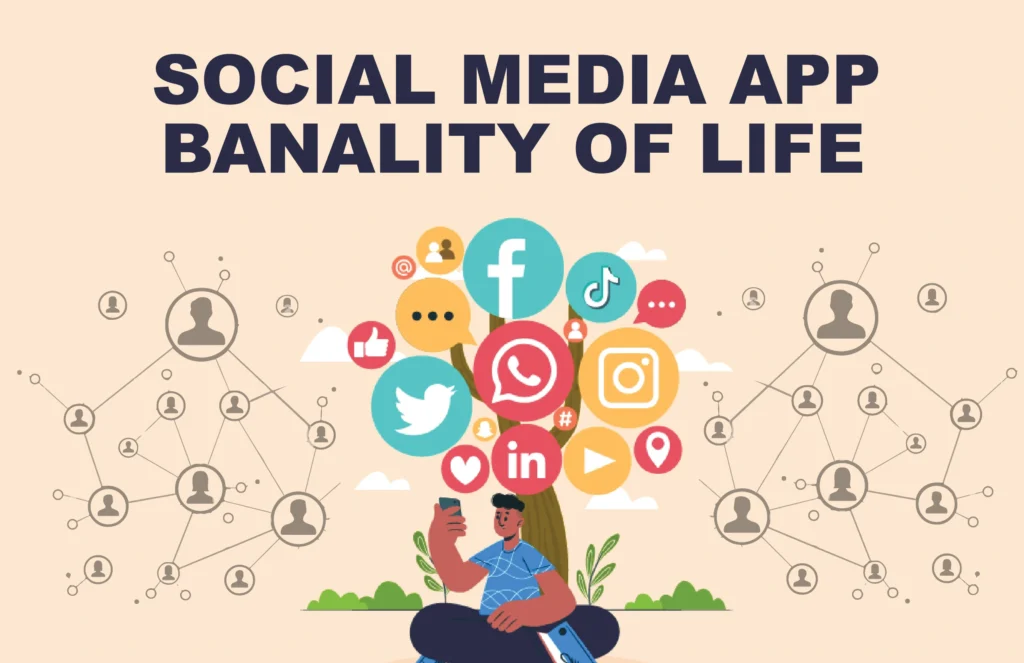In the 21st century, social media has become an intrinsic part of our lives, shaping the way we communicate, share, and perceive the world around us. While these platforms provide countless benefits—connecting people, fostering communities, and facilitating the exchange of ideas—there is a darker side to the pervasive use of social media apps: the banality of life. In this guide, we’ll delve into the phenomenon of social media’s influence on our perceptions of reality, exploring how it has contributed to the dulling of authentic human experiences and how we can reclaim a sense of meaning in an increasingly digitized world.
The Rise of Social Media and Its Impact on Reality
Social media has been an undeniable force in modern society. Platforms like Facebook, Instagram, Twitter, TikTok, and others have transformed the way we interact, access information, and share experiences. However, with this rapid rise comes a shift in the way we experience the world. What was once an authentic, spontaneous process of sharing ideas and emotions has now become a curated, filtered, and often performative exercise in creating a version of life that appears more exciting, glamorous, or perfect than it may actually be.
This trend has led to the banality of life, where the act of living becomes monotonous and repetitive due to the overwhelming presence of digital stimuli. It is no longer enough to simply live a life; one must also create a life that can be consumed and validated by others in the digital space. The constant barrage of content, carefully crafted images, and often superficial interactions has diminished the true joy of simple, meaningful moments.
Curated Realities: The Performance of Perfection
One of the most significant ways social media contributes to the banality of life is through the phenomenon of curated realities. Platforms like Instagram and Facebook encourage users to post only the highlights of their lives—vacations, celebrations, achievements, and other seemingly perfect moments. This results in a constant comparison between the polished, idealized version of life that people present online and the often more mundane, everyday experiences that make up the majority of real life.
As a result, many people begin to feel dissatisfied with their own lives, constantly chasing after a form of perfection that doesn’t exist in reality. The pressure to showcase happiness or success can lead to feelings of inadequacy, loneliness, and anxiety. This cycle of comparison, paired with the constant need for validation in the form of likes, comments, and shares, reduces the quality of our experiences to mere content for consumption.
Instant Gratification and the Erosion of Meaning
Social media apps are designed to give us instant gratification—a like, a retweet, a comment—all designed to make us feel good in the moment. While this may seem harmless, this constant need for instant feedback has contributed to a shallow understanding of happiness and fulfillment. People are conditioned to seek validation from their followers, friends, and peers, relying on the quick rush of a notification rather than cultivating deeper, more meaningful connections in the real world.
This instant gratification creates a superficial sense of achievement, eroding the deeper meaning that comes from sustained effort, patience, and real-world engagement. As we grow accustomed to receiving immediate rewards in the form of notifications, our attention spans shorten, and the value of long-term fulfillment becomes obscured. The pursuit of likes and shares may, at first, feel gratifying, but it often leaves us with a sense of emptiness, as these digital rewards offer little substance in comparison to the rich, multifaceted experiences that truly enrich our lives.
The Illusion of Connection and the Rise of Isolation
Another consequence of social media’s dominance in modern life is the illusion of connection. While platforms like Facebook, Instagram, and Twitter offer us a way to stay connected with friends and family, they also create a superficial form of interaction that lacks the depth and emotional resonance of face-to-face communication. These platforms foster a culture of surface-level engagement, where likes, comments, and shares often replace more meaningful conversations.
As a result, people may find themselves increasingly isolated despite having a multitude of “connections” online. This digital loneliness can be exacerbated by the constant exposure to others’ seemingly perfect lives, creating a cycle of isolation where people feel more disconnected from others and from themselves. Social media often cultivates a sense of disconnection, where individuals are more concerned with presenting a curated version of themselves than with building genuine, authentic relationships.
The Banality of Content Consumption
A large part of the banality of life caused by social media is the banal consumption of content. The endless scroll of images, videos, and articles leads to a sense of overwhelm and mental fatigue. The sheer volume of content available, paired with the lack of substance in many posts, contributes to a feeling of detachment from the real world. Social media apps have conditioned users to mindlessly scroll through posts, without truly engaging or reflecting on what they see.
This mindless consumption of content, often driven by algorithms that prioritize engagement over substance, leads to a shallow engagement with the world. The constant influx of bite-sized information and fleeting entertainment often drowns out opportunities for more meaningful, reflective moments. Over time, this results in a feeling of emptiness, as individuals seek deeper meaning but are caught in the cycle of passive content consumption.
Breaking Free from the Banality of Social Media
While social media is unlikely to disappear entirely, there are steps we can take to reclaim meaning in our lives and combat the banality of modern digital culture.
1. Curate Your Digital Space
To begin reclaiming meaningful experiences, it is essential to curate your digital space thoughtfully. Unfollow accounts that foster negative emotions or comparisons, and instead follow those that inspire you, promote creativity, and foster positivity. Limiting exposure to content that contributes to banality will help make your social media experience more intentional.
2. Practice Mindful Engagement
Rather than mindlessly scrolling, engage with content more consciously. Reflect on what resonates with you and why, and avoid getting trapped in the endless cycle of seeking validation. Set limits on your social media usage, and take breaks from it to engage in activities that nourish your mind and soul.
3. Reconnect with Real-Life Experiences
Reconnect with authentic, offline experiences—whether it’s a walk in nature, a conversation with a friend, or simply enjoying a meal without distraction. These moments, though not always glamorous, are often more fulfilling than any post shared online.
4. Focus on Self-Worth Beyond Validation
Shift your focus from seeking approval through likes and comments to recognizing your intrinsic value. Practice self-compassion and appreciate the journey, rather than seeking external validation through digital feedback.
Conclusion: Embracing Authenticity in a Digital World
The banality of life caused by social media apps can feel overwhelming, but by becoming more intentional in how we engage with these platforms, we can break free from the cycle of comparison and superficiality. Authenticity, meaningful connections, and real-world experiences offer the depth and richness that social media often fails to provide. As we reclaim our time and attention, we can rediscover a life filled with purpose, connection, and true fulfillment beyond the digital screen.



